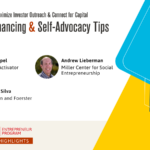To encapsulate the year in impact, we asked a few of our media partners to share three must-read stories they published in 2016.
We partner with a growing number of independent media outlets that produce excellent coverage related to impact investing and social entrepreneurship, providing a year-round source of in-depth analysis and insightful stories on topics that matter to the SOCAP community.
Real Leaders

Curated by Grant Schreiber, Editor of Real Leaders
Launched in 2010, Real Leaders is the world’s first sustainable business & leadership magazine. With a global audience of more than 24,000 CEOs in 130 countries, who control more than $6 trillion in spend, the magazine aims to inspire better leaders for a better world; a world of far-sighted, sustainable leadership that helps find solutions to the world’s problems. Real Leaders invests in social entrepreneurs, organizations and events that are creating a better world and having a positive impact – reaching more than 100 million people worldwide each year – including their latest investment: “SOCAP in partnership with Real Leaders.”
Richard Branson: Reinventing how we live and work to become a force for good.
The energetic and playful entrepreneur believes the time is right for a radically different approach to business. He’s ready to explore the next great frontier.
Impact Investing Goes Mainstream.
You cannot separate people from the environment,” says former Mission Markets CEO Michael Van Patten, and current Founder of ethical investment tech company my4. His new company is a marketplace for investors within the impact and sustainability sector looking for a way to align their personal values with their investments. He shared his views on impact investing with us.
Making Money Matter
Nick O’Donohoe moved from big finance to a big society bank when he realized that investment meant more than just money in the bank. If you have a U.K. bank account that has been lying dormant for longer than 15 years, there’s a good chance Nick O’Donohoe now has your money. O’Donohoe is the CEO of Big Society Capital (BSC); a U.K. based social investment company and the world’s first social investment bank.
B Magazine
Curated by Jennifer Kongs, Managing Editor, B the Change Media
Put Your Money Where Your Community Is
Detroit was a case study in bad government and urban blight, but then local investors and entrepreneurs said, “Enough.” From Detroit SOUP community crowdfunding meetings to organizations such as the New Economy Initiative, Develop Detroit and Capital Impact Partners, the city’s residents are showing control over their own destinies, and playing a vital role in bringing their own city back. By Oscar Perry Abello
Underserved Communities, High-Growth Opportunity
Kesha Cash’s Impact America Fund is connecting pioneering investors with overlooked entrepreneurs to build a more diverse marketplace. In two years, Cash closed the fund with $10 million in assets under management and a focus on scaling tech solutions and uplifting underserved communities. By Susan Price, underwritten by the Case Foundation
The Lollapalooza of Investing
As “impact” becomes a buzzword and big-name investment firms step in, the annual SOCAP conference serves as a microcosm of the tensions and challenges surrounding social capital — and the debate about who deserves a seat at the table. By Amy Cortese
Conscious Company

Curated by Rachel Zurer, Editorial Director at Conscious Company
Conscious Company Magazine was the first nationally distributed publication in the US to focus solely on sustainable business and business as a force for good.
An Inspiring Story of What to Do with Extra Wealth
Carol Newell had a small fortune and a vision. Joel Solomon had the values and talent to bring it to life. Together, these pioneers of impact investing executed a 25-year plan that began to change Vancouver and ideas about what money can do.
With what by modern standards is actually a quite modest amount of “big money,” since 1993 Newell and Solomon’s influence has helped transform Vancouver’s economy from a resource-extractive environmental problem zone to one of the world’s premier hotbeds of tech innovation, sustainable enterprise, and smart growth. “We helped normalize a values-driven business orientation,” Newell says. “And we learned that leveraging personal capital in a radical way can actually fuel change significantly and quickly.”
This feature story tells the story of what the pair achieved, how they thought about it, and what’s next.
How to Shut Up, and Other Lessons From the Godfather
If you want to know what Jed Emerson thinks about investing or entrepreneurship, first read his books. He took a lot of time to write them, so get up to speed before asking for his input. Of course, his perspective is always evolving. It will have evolved between when he spoke to Amber Nystrom in August 2016 and when you meet him.
His ever-shifting thinking is a sign of what his mind is like these days: Open. Reflective. Curious. After decades of pioneering the “how” of combining purpose and profit, Emerson now finds himself more interested in the “why” — the deep questions about values and meaning. He’s pulled his nose out of the weeds and is busy exploring the meadow. After enjoying an afternoon wandering alongside him, we collected this bouquet of his thoughts on the future of conscious business, authentic leadership, and why it’s important to create the space for yourself to grow.
How to Change the World: Buy Stock. Make Demands. Repeat.
Natasha Lamb, director of equity research and shareholder engagement at the Boston-based investment firm Arjuna Capital, is on a mission to address the gender-based pay disparities prevalent throughout the tech world. Her weapon of choice is the shareholder proposal, a little-known, yet extremely effective tool that democratizes investors’ ability to participate in the governance process of companies they own stock in. Using the shareholder proposal, Lamb, 33, has brought the issue of gender-based pay equity to nine of the largest tech companies in the world, and is achieving dramatic results. We spoke with Lamb about the process, the business case for pay equity, and what gave her the courage to take on the largest companies in the world.
ImpactAlpha

Curated by Zuleyma Bebell, Director of Operations and Data Lead at ImpactAlpha
Led by David Bank, formerly of The Wall Street Journal, ImpactAlpha has become a leader in impact investing news and media outlet for the growing number of people who believe our most pressing social and environmental challenges represent the biggest business opportunities of the 21st century.
Global Entrepreneurs to Silicon Valley: We Have Arrived
The melding of Silicon Valley’s tech-fueled growth model and the explosion of entrepreneurial activity around the world is long overdue. For all of the disruptions wrought by the global digital revolution, the Valley has sometimes turned its back on the rest of the world. Overbroad as it may be, there’s some basis for the reputation that Sand Hill Road venture capitalists favor privileged, self-absorbed techies solving the urgent problems of 20-something San Francisco scenesters. This year there were a number of signs indicating that the Valley’s investors and other top VCs are beginning to look beyond apps, and beyond the Bay Area. In June of 2016, the rest of the world came to Silicon Valley, for the seventh Global Entrepreneurship Summit, sponsored by the U.S. State Department. Many, if not most of the 700 entrepreneurs and innovators are tackling social or environmental challenges.
Wishful Thinking: Clean Energy Revolution Trumps Climate Skepticism at Global Climate Talks
The falling price of solar energy and other renewables may trump the rise of climate-change skeptics in the U.S. government. Implementing the Paris Agreement will enable and encourage businesses and investors to turn the billions of dollars in existing low-carbon investments into the trillions of dollars the world needs to bring clean energy and prosperity to all, business leaders wrote at the Climate Conference in Marrakesh in November.
Read This if You are Not a Zillionaire: Impact Investing For the Rest of Us
Ample research indicates that everyday investors increasingly care about the impact of the investments they make. But impact investing products – funds, direct deals, social impact bonds and the like – have mostly been geared to high net worth individuals and institutional investors. Supply is beginning to catch up with demand for impact investing products for “retail” investors.
NextBillion
Curated by James Militzer, Senior Editor at NextBillion.
NextBillion focuses on the challenges and opportunities of doing business in emerging markets, so investing is at the heart of much of our work. These three articles give a taste of our impact investing coverage, which features blog posts, video and written interviews with industry leaders, conference coverage, aggregated news items and a calendar of impact-focused events.
Closing the $2.5 Trillion Gap: How blended finance can help achieve the SDGs
$3.9 trillion: As the estimated annual funding needed to achieve the Sustainable Development Goals, it’s one of the most quoted numbers in international development today. Coming up with those funds is a pretty tall order – especially considering that current annual levels of official development assistance funding are only $180 billion, with combined public and private investment in the SDGs at only $1.4 trillion. How can the world fill an annual funding gap of $2.5 trillion? According to Chris Clubb and Dean Segell at Convergence, private investors will be key to the effort – and blended finance could help. They describe the approach, its potential, and the challenges it faces in achieving scale in this article – one of hundreds of guest posts NextBillion publishes each year, from entrepreneurs, researchers and other thought leaders working across the development sector.
Hippies vs. Capitalists at SOCAP
The discussion at SOCAP is always thought-provoking, but this year one panel stood out. Called “Getting Real Around the Tensions of Impact,” it was framed around an interesting contradiction in impact investing: In its efforts to go mainstream, the industry has gone to great lengths to emphasize that it can deliver positive impact without conceding financial returns. But does that approach reinforce the existing market expectations for growth and short-term profit that have unleashed capitalism’s more destructive tendencies in the first place? The panelists discussing the topic didn’t hold back – and neither did our analysis, which wondered whether SOCAP’s “hippie vibe” is too easily discarded when discussion shifts from the need for the world to change its wealth structures, to the suggestion that investors might have to accept less money in the process.
Impact Investing Buzz: GIIN and Toniic Mix with Growth Reports
Along with SOCAP (one of our favorites), NextBillion attends several key conferences throughout the year. Contributing editor Scott Anderson recently got back from the Global Impact Investing Network (GIIN)’s Investor Forum in Amsterdam, and he filed an intriguing report on some buzz-worthy new studies that sparked discussion there. One knock against impact investing, he wrote, is the lack of long-term data and platforms to observe deals in a more transparent way. But at the conference, the GIIN and Toniic, arguably the industry’s most influential trade groups, both released reports designed to turn around those perceptions. Anderson discussed the studies and what they could mean for the sector in this post – one example of NextBillion’s extensive conference coverage, which includes editorial analysis, live-tweeting, live video of panels, and insightful interviews with the thought leaders in attendance.
Stanford Social Innovation Review (SSIR)

Curated by Carrie Pogorelc, the Advertising, Events, and Circulation Manager at Stanford Social Innovation Review
Stanford Social Innovation Review (SSIR) is a powerful resource for social change leaders from around the world and from all sectors of society, providing insights into the strategies, ideas, innovations, practices, tools, and research that organizations are employing to transform the world for the better.
Tackling Heropreneurship
We’ve entered an era of heropreneurship, where reverence for the heroic social entrepreneur has led countless people to pursue a career path that promises opportunities to save the world, gain social status, and earn money, all at the same time. Daniela Papi-Thorton explains why we need to move from “the social entrepreneur” to social impact.
Across the Returns Continuum
For many years, the field of impact investing played host to great debates that involved seemingly irreconcilable positions: Was it possible to achieve both market-rate financial returns and meaningful social impact? Could philanthropic funding coexist effectively with commercial investment? Now, as the field reaches a new stage of maturity, leading social finance organizations are developing models that bring greater sophistication to the work of evaluating investment options. These models, like the investors that create them, vary widely. But they reflect a shared commitment to moving beyond simple either-or choices—and to moving from broad questions to specific solutions.
Omidyar Network has built a framework for pursuing investment opportunities that takes into account not only firm-level impact but also market-level impact.
A Neoliberal Takeover of Social Entrepreneurship?
Jyoti Sharma explores how a model of social entrepreneurship focused on market-based solutions and profit is threatening to crowd out more collaborative approaches.
SSIR is offering a $10-off discount for SOCAP conference attendees to stay informed and inspired about all things social innovation. Click here to subscribe with this discount!
TriplePundit

Curated by Jennifer Boynton, Editor in Chief of TriplePundit
TriplePundit.com features news and analysis on sustainable business and the triple bottom line.
Financing Fair Trade Supply Chains
Getting fair trade certified is one thing, but finding small-scale suppliers who are certified presents a whole new challenge. Here’s how Guayaki’s yerba mate farmers get the financing they need to meet market demand. Social finance and fair trade leaders are working on solutions to this critical funding gap.
Crowdfunding Now Open for Social Enterprise Start-ups
“Regulation crowdfunding” is a lot like Kickstarter, with one big difference: When investors send money through Wefunder or SeedInvest, they get stocks or bonds instead of CDs and thank-you notes. This represents a huge opportunity for small time investors to support companies they care about. Here’s how it works.
Education in Liberia: A Case Study in Maximizing Your Philanthropic Investment
Liberian schoolchildren face a number of obstacles. NGOs on the ground are out to help — and modest philanthropic investments can keep them going. But the practical nuts and bolts of moving supplies to people who need them don’t always get the funding attention they deserve. Here’s how one innovative NGO worked around this challenge.
To learn more about these and other valuable sources of information and commentary, read Gary Gach’s recent guide: The Good News: Media Outlets Focused on Social Entrepreneurship and Impact Investing







